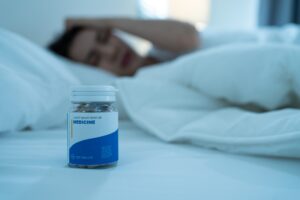Testosterone replacement therapy (TRT) has become an increasingly common treatment for men experiencing the effects of low testosterone. While once misunderstood and often equated with performance-enhancing steroid use, TRT is now widely recognised as a medical intervention designed to restore hormone levels to a healthy, functional range. But what really happens when you start TRT, and what should you expect in terms of benefits and potential risks?
Understanding Testosterone and Its Role
Testosterone is the primary male sex hormone, playing a crucial role in muscle mass, fat distribution, bone density, energy levels, mood, and sexual health. Levels naturally peak in early adulthood and decline gradually with age. For some men, this decline is significant enough to cause symptoms such as fatigue, low libido, brain fog, loss of muscle, and increased body fat.
Clinical research has linked low testosterone with increased risk for cardiovascular issues, metabolic dysfunction, and reduced quality of life [NIH]. Establishing a baseline level in your 20s and monitoring changes as you age is strongly recommended, as it provides context for what is “normal” for you personally.
The Benefits of Starting TRT
When testosterone is restored to an optimal level through TRT, many men report significant improvements in how they feel and function. The benefits are not instant but often develop gradually over weeks to months of consistent treatment.
1. Improved Body Composition
One of the most noticeable changes with TRT is the ability to maintain or increase lean muscle mass while reducing fat. Research shows that testosterone influences metabolic rate and fat distribution, meaning healthy levels support easier fat loss and better muscle preservation [PubMed].
2. Enhanced Cognitive Function
Declining testosterone is often associated with brain fog, reduced focus, and lower motivation. Restoring healthy levels has been shown to support cognitive performance, memory, and mental sharpness. Many men report a noticeable improvement in clarity of thought and overall drive once they are balanced.
3. Increased Energy and Vitality
Low testosterone is a common but overlooked cause of chronic fatigue. By correcting hormone levels, TRT can restore energy, helping men feel more active and resilient in daily life. This also supports a more consistent workout routine, further compounding physical and mental benefits.
4. Better Heart and Metabolic Health
Contrary to outdated assumptions, low testosterone—not high—is linked with higher cardiovascular risk. Restoring levels can support better glucose regulation, insulin sensitivity, and protection against metabolic syndrome. In some cases, TRT has been associated with improvements in fatty liver and markers of cardiovascular health.
5. Restored Libido and Sexual Function
A loss of interest in intimacy is one of the hallmark signs of low testosterone. By normalising hormone levels, TRT often restores libido and sexual performance, leading to a positive impact on relationships and overall confidence.
What TRT Does Not Do
It is important to recognise that TRT is not a “magic bullet.” While it enhances many aspects of health, it must be combined with proper diet, exercise, and lifestyle habits to deliver its full benefit. TRT will not compensate for poor sleep, excessive alcohol intake, or lack of physical activity. Instead, it should be seen as a foundation that allows other health-promoting behaviours to work more effectively.
Potential Risks and Considerations
Like any medical intervention, TRT comes with potential risks and considerations:
- Hormone imbalance: Dosage must be carefully monitored and adjusted to avoid excessive levels, which can create unwanted side effects.
- Long-term commitment: Once you begin TRT, your body may reduce its natural production, meaning it is often a lifelong therapy.
- Individual variability: Not every man responds the same way, and treatment should be personalised under professional medical supervision.
Working with a specialist clinic or physician who focuses on hormone replacement is essential. Regular blood work, open discussions about symptoms, and careful monitoring of all hormones—not just testosterone—ensure that therapy remains safe and effective.
TRT and the Idea of “Enhancement”
Many men hesitate to begin TRT because they associate it with “cheating” or performance-enhancing drug use. However, this is a misconception. Being “enhanced” in this context simply means that your body is restored to a healthy functional level, comparable to hormone levels typically seen in younger adulthood. Much like supplementing with vitamin D or using medication to control blood pressure, TRT is a tool to optimise health and quality of life.
TRT is not about pushing the body beyond natural limits. It is about restoring balance, energy, and health when natural testosterone declines.
When to Consider TRT
Most men begin considering TRT in their 40s or 50s, when symptoms of low testosterone become noticeable. However, hormone decline can begin earlier, and even younger men can experience clinically low levels. If symptoms such as fatigue, low libido, cognitive changes, or difficulty maintaining body composition appear, it may be worth checking hormone levels.
Women can also benefit from hormone optimisation, though treatment protocols differ due to the complexity of female hormone cycles. For both men and women, working with a qualified healthcare provider is essential to determine if TRT or hormone therapy is appropriate.
Final Thoughts
Starting TRT can be life-changing when guided by evidence, proper medical oversight, and a personalised approach. It is not without considerations, but for many, the improvements in energy, vitality, body composition, and mental sharpness far outweigh the risks. The key is to view TRT as part of a broader commitment to health and not as a standalone solution.
Video Summary
For more evidence-based nutrition and fitness tips, subscribe to our channel: https://www.youtube.com/@Vitality-and-Wellness
Looking for extra help with your fitness goals? Check out the personalized Nutrition Program at Parkway Athletic Club: parkwayathleticclub.com/nutrition
Disclaimer: This content is for educational purposes and does not replace personalized medical advice.



